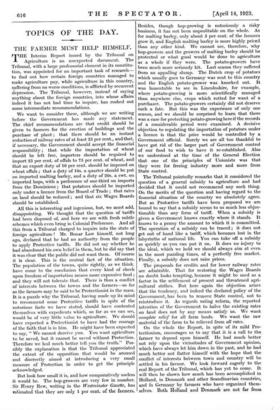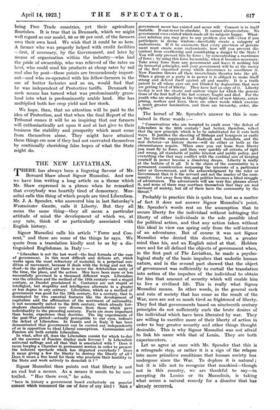TOPICS OF THE DAY.
THE FARMER MUST HELP HIMSELF.
11 HE Interim Report issued by the Tribunal on Agriculture is an unexpected document. The Tribunal, with a large professorial element in its constitu- tion, was appointed for an important task of research— to find out how certain foreign countries managed to make agriculture pay, while agriculture in this country, suffering from no worse conditions, is afflicted by recurrent depression. The Tribunal, however, instead of saying anything about the foreign countries, into whose affairs indeed it has not had time to inquire, has rushed out some intermediate recommendations.
We want to consider these, although we arc writing before the Government has made any statement. The chief recommendations are that credit should be given to farmers for the erection of buildings and the purchase of plant ; that there should be an instant reduction of railway rates of at least 25 per cent., and that, if necessary, the Government should accept the financial responsibility ; that while the importation of wheat should be left free, importers should be required to import 25 per cent. of offals to 75 per cent. of wheat, and that an export duty of 10 per cent. should be imposed on wheat offals ; that a duty of 10s. a quarter should be put on imported malting barley, and a duty of 20s. a cwt. on imported hops, with a preference of one-third on imports from the Dominions ; that potatoes should be imported only under a licence from the Board of Trade ; that rates on land should be reduced ; and that six Wages Boards should be established.
All this is interesting and ingenious, but, we must add, disappointing. We thought that the question of tariffs had been disposed of, and here we are with fresh subtle schemes which even bring in Colonial Preference. And all this from a Tribunal charged to inquire into the state of foreign agriculture ! Mr. Boner Law himself, not long ago, declared that he had no authority from the people to apply Protective tariffs. He did not say whether he had abandoned his own belief in them, but he did say that it was clear that the public did not want them. Of course it is clear. This is the central fact of the situation. The population of the towns, quite rightly, as we think, have come to the conclusion that every kind of check upon freedom of importation means more expensive food ; and they will not tolerate that. There is thus a conflict of interests between the towns and the farmers—so far as the farmers may be said to be Protectionist in the mass. It is a puzzle why the Tribunal, having made up its mind to recommend some Protective tariffs in spite of the notorious facts we have stated, should have contented themselves with expedients which, so far as we can see, would be of very little value to agriculture. We should have expected a Protectionist to have had the courage of the faith that is in him. He might have been expected to say, " We cannot deceive you. You want agriculture to be saved, but it cannot be saved without Protection.
Therefore we had much better tell you the truth." Pos- sibly the explanation is that the Tribunal appreciated the extent of the opposition that would be aroused and discreetly aimed at introducing a very small measure of Protection in order to get the principle acknowledged.
But look how small it is, and how comparatively useless it would be. The hop-growers are very few in number.
Sir Henry Rew, writing in the Westminster Gazette, has estimated that they are only 1 per cent. of the farmers. Besides, though hop-growing is notoriously a risky business, it has not been unprofitable on the whole. As for malting barley, only about 5 per cent. of the farmers grow it, and English malting barley is more highly priced than any other kind. We cannot see, therefore, why hop-growers and the growers of malting barley should be protected or what good would be done to agriculture as a whole if they were. The potato-growers have been much more seriously hit. Last season they suffered from an appalling slump. The Dutch crop of potatoes which usually goes to Germany was sent to this country and the English potato-grower was knocked out. It was lamentable to see in Lincolnshire, for example, where potato-growing is more scientifically managed than anywhere else, crops which rotted for want of a purchaser. The potato-growers certainly did not deserve such a fate. But this was the experience of only one season, and we should be surprised to learn that there was a case for protecting potato-growing here if the records of a considerable period were examined. A decisive objection to regulating the importation of potatoes under a licence is that the price would be controlled by a Government official. Surely we are all too thankful to have got rid of the larger part of Government control of our food to wish to have it re-established. Also we understood at the time of the General Election that one of the principles of Unionists was that they were for freeing industry more and more from State control.
The Tribunal pointedly remarks that it considered the question of a general subsidy to agriculture and had decided that it could not recommend any such thing. On the merits of the question and having regard to the financial situation of the country we absolutely agree. But as Protective tariffs have been proposed we are bound to say that a subsidy seems to us much less objec- tionable than any form of tariff. When a subsidy is given a Government knows exactly where it stands. It knows to a penny the amount to which it is committed. The operation of a subsidy can be traced ; it does not get out of hand like a tariff, which becomes lost in the labyrinths of national life. You can take off a subsidy as quickly as 'you can put it on. It does no injury to the ideal, which we hold we should always aim at even in the most puzzling times, of a perfectly free market. Finally, a subsidy does not raise prices.
The -Proposals for credits and for lower railway rates are admirable. That for restoring the Wages Boards no doubt looks tempting, because it might be used as a factor in the settlement of present and threatened agri- cultural strikes. But here again the objection arises that the tendency, and indeed the declared policy of the Government, has been to remove State control, not to reintroduce it. As regards rating reform, the reported intention of the Government to halve the existing rates on land does not by any means satisfy us. We want complete relief for all farm lands. We want the raw material of the farm to be relieved from all rates.
On the whole the Report, in spite of its mild Pro- tectionism, encourages us to say that it is a call to the farmer to depend upon himself. He had much better not rely upon the vicissitudes of Government opinion, which have always let him down in the past, and he had much better not flatter himself with -the hope that the conflict of interests between town and country will be settled in his favour. We look forward eagerly to the real Report of the Tribunal, which has yet to come. It will then be shown how much has been accomplished in Holland, in Denmark and other Scandinavian countries, and in Germany by farmers who haVe organized them- selves. Both Holland and Denmark are not -far from being Free Trade countries, yet their agriculture flourishes. It is true that in Denmark, which we might well regard as our model, 80 or 90 per cent. of the farmers own their own land. We wish that it could be so here. A farmer who was properly helped with credit facilities —first, if necessary, by the Government, and later by means of organization within the industry—who had the pride of ownership, who was relieved of the rates on land, who could send his products at cheap rates by rail and also by post—these points are tremendously import- ant—and who co-operated with his fellow-farmers in the use of butter factories and so on, would find that he was independent of Protective tariffs. Denmark by such means has turned what was predominantly grass- land into what is predominantly arable land. She has multiplied both her crop yield and her stock.
We hope, then, that no attention will be paid to the idea of Protection, and that when the final Report of the Tribunal comes it will be so inspiring that our farmers will enthusiastically act upon it and at last give to their business the stability and prosperity which must come from themselves alone. They might have attained these things ere now if they had not enervated themselves by continually cherishing false hopes of what the State might do. -











































 Previous page
Previous page